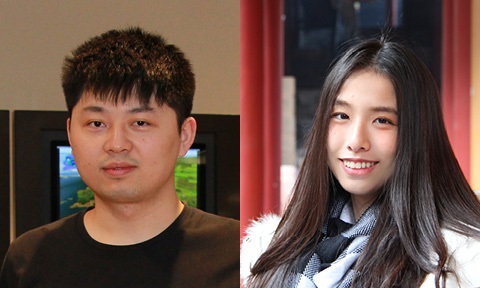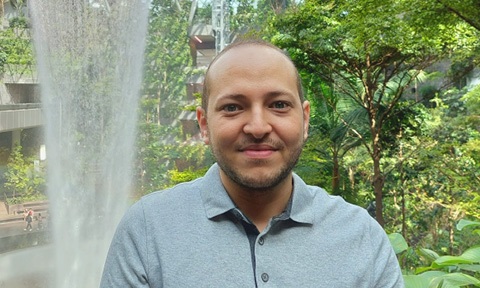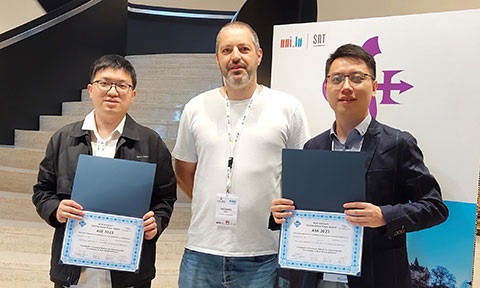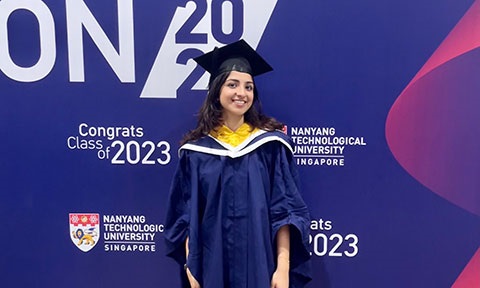Students from SCSE and EEE wins the Microsoft Virtual Hackathon 2022

Students from SCSE Ritik Bhatia (CS, Year 4. Standing on the right) and EEE Aishik Naga (Year 4) have emerged as the Winners of Microsoft APAC Hackathon!!
In this competition that received submissions from over 15 countries in the APAC region, they won 2 prizes (including a total cash prize of USD 6000):
- Overall 1st Prize (cash prize of USD 5000)
- Special Prize for Best use of Azure (an additional cash prize of USD 1000)
They really enjoyed their journey of this hackathon over the past 2 months, and there were some very dignified judges who came to view their project including:
- Gandhali Samant (Director, Developer Ecosystem and Market Engagement, GitHub)
- Annie Mathew (Director, Developer Relations, Microsoft Asia Pacific)
- Justin Baird (CTO, APAC, Microsoft)
Their winning Project was Geolytics.AI



Building Disaster Resilient Communities
Geolytics.AI provides State-of-The-Art AI powered Disaster Risk Management services to save lives and property through Microsoft Azure.
Their project solves the following UN SDG's
1. Sustainable Cities and Communities (UN SDG 11)
2. Climate Action (UN SDG 13)
They discussed with National Disaster Management Authority (NDMA) India and Earth Observatory of Singapore to understand the gaps in technology for DRM and develop the following:
Disaster Detection: The first step in disaster relief is detecting disasters. However, there is over reliance on sensor readings for detections, which leads to a single point of failure in critical situations. They developed Cross Validated pipelines integrating satellite and sensor readings with witness reports for accurate detections.
This includes real time Disaster Detection from witness Image and video streams, NLP based Citizen Science for community verification and Hazard Reports from relief portals.
Damage Assessment: Upon detection of disasters, teams are sent to manually assess the damage. This process takes days to weeks and is prone to human error, leading to massive losses in lives and property.
They have developed Deep Learning Systems for Damage Localization and Classification from Satellite Imagery (which is the first source of data in disaster situations) with over 97% F1 score for the State-of-The-Art performance. This completely removes the need for on-site assessments after disasters.
Damage Simulation: They provide hazard-agnostic simulation tools to assess the performance of diverse assets after disasters. Organizations can use this feature to estimate losses to assets, their repair costs and estimated repair times for performance engineering.
Dashboards, analytics and support for getting quick insights and integration into organizational workflows
Reliable and Scalable REST API endpoints that expose our AI models and rich backend data for seamless integration.
The fully functioning App Demo Video can be found from the following link, exhibiting all their features live:
https://www.youtube.com/watch?v=EdVWveJYe6A
The competition page features their project in the Winners section here:
https://www.hackerearth.com/challenges/hackathon/microsoft-virtual-hackathon-2022/
There were 750 Participants from over 15 countries taking part in the competition, with 3 total rounds:
- Phase 1 (Ideation Phase)
- Top 34 teams shortlisted to move into Phase 2 (Prototype phase)
- Top 10 teams pitch their products to The Microsoft Executive Panel in the Grand finals for live judging and selection of winners
As part of the competition benefits, they have been accepted into the Microsoft for Startups Founders Hub, which provides cloud credits, access to cutting edge Microsoft Tools and technologies such as OpenAI Innovation License and
subscriptions to Microsoft's Enterprise level developer and productivity tools among many other benefits to take their project forward.
To take Geolytics.AI forward, they have set up meetings with State and National Disaster Management Authorities in India to initiate pilot runs, and to implement their offerings into their workflows. They have received quite a positive response in this end, with talks to also maintain and integrate the Management Authorities in house apps with their own application.














/enri-thumbnails/careeropportunities1f0caf1c-a12d-479c-be7c-3c04e085c617.tmb-mega-menu.jpg?Culture=en&sfvrsn=d7261e3b_1)

/cradle-thumbnails/research-capabilities1516d0ba63aa44f0b4ee77a8c05263b2.tmb-mega-menu.jpg?Culture=en&sfvrsn=1bc94f8_1)

7e6fdc03-9018-4d08-9a98-8a21acbc37ba.tmb-mega-menu.jpg?Culture=en&sfvrsn=7deaf618_1)


a57ab68f-1049-4be2-a83a-d3821af9aeee.tmb-listing.jpg?Culture=en&sfvrsn=e59ee71c_1)



